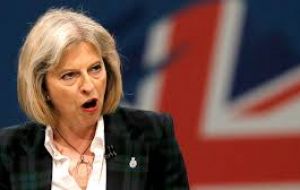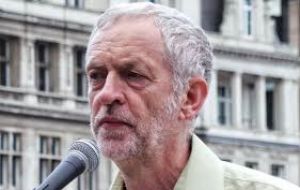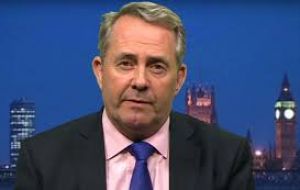MercoPress. South Atlantic News Agency
Blow for PM May: High Court rules Parliament must approve Brexit process
 Calling the case “a pure question of law”, Lord Thomas said: “The court is not concerned with and does not express any view about the merits of leaving the European Union: that is a political issue.”
Calling the case “a pure question of law”, Lord Thomas said: “The court is not concerned with and does not express any view about the merits of leaving the European Union: that is a political issue.”  If the court’s ruling is upheld the Brexit plan plan would be thrown into disarray as Mrs. May would be forced to give Parliament a detailed strategy for negotiating British departure
If the court’s ruling is upheld the Brexit plan plan would be thrown into disarray as Mrs. May would be forced to give Parliament a detailed strategy for negotiating British departure  Labour leader Jeremy Corbyn urged the government “to bring its negotiating terms to Parliament without delay”, adding that ”there must be transparency and accountability to Parliament on the terms of
Labour leader Jeremy Corbyn urged the government “to bring its negotiating terms to Parliament without delay”, adding that ”there must be transparency and accountability to Parliament on the terms of  Reacting to the ruling, International Trade Secretary Liam Fox told the House of Commons the government was “disappointed” but remained “determined to respect the result of the referendum”.
Reacting to the ruling, International Trade Secretary Liam Fox told the House of Commons the government was “disappointed” but remained “determined to respect the result of the referendum”.  .UKIP leader Nigel Farage said he feared a “betrayal” of the 51.9% of voters who backed leaving the EU in June's referendum and voiced concern at the prospect of a “half Brexit”.
.UKIP leader Nigel Farage said he feared a “betrayal” of the 51.9% of voters who backed leaving the EU in June's referendum and voiced concern at the prospect of a “half Brexit”. British government’s plan for leaving the European Union was thrown into uncertainty on Thursday after the High Court ruled that Parliament must give its approval before the process can begin. The court’s decision seemed likely to slow — but not halt — the British withdrawal from the bloc, a step approved by nearly 52% of voters in a June referendum.
Nevertheless, the decision on Thursday was a significant blow to Prime Minister Theresa May, who had planned to invoke Article 50, the mechanism for leaving the European Union, no later than the end of March and to prepare for the negotiations mostly behind closed doors.
If the court’s ruling is upheld — the government immediately vowed to appeal — that plan would be thrown into disarray, analysts said, as Mrs. May would be forced to give Parliament a detailed strategy for negotiating the British departure, known as Brexit. She has adamantly resisted doing so, arguing that this would impede her flexibility in the negotiations, preventing Britain from getting the best possible deal.
Few observers believe that Parliament would go so far as to block a departure from the bloc, as lawmakers themselves voted overwhelmingly to hold the referendum and pledged to abide by the results.
The more likely impact could be to weaken Mrs. May’s grasp on the negotiating process. This, in turn, could force her to soften her declared strategy of controlling immigration, even if that means leaving the European Union’s tariff-free single market — the so-called hard Brexit that was widely perceived as a threat to the British economy.
It was that prospect that led currency traders to bid up the pound Thursday morning, lifting it from the multidecade lows it had been plumbing in recent weeks.
But it was not immediately clear how the politics would play out. The Conservative government is already split over what kind of future relationship it wants with the European Union, and in general, members of Parliament were not in favor of leaving the bloc in the first place. The government hoped to get the talks started without a major parliamentary debate and potential interference, especially in the House of Lords, where the Conservatives do not have a clear majority.
If Mrs. May should find parliamentary opposition intolerable, she might ultimately be tempted to seek an early general election to gain a wider mandate for Brexit, some analysts said. Currently, her Conservative Party holds a slim majority, with 329 seats in the 650-seat Parliament, and many of those members opposed Brexit.
On Thursday, the government said that an expedited appeal would be heard in December by the Supreme Court, Britain’s highest appellate body, and that it was sticking to its timetable for Brexit for now. Yet in the growing environment of constitutional, legal and political uncertainty, the government’s strategy could easily be disrupted.
Labour leader Jeremy Corbyn urged the government “to bring its negotiating terms to Parliament without delay”, adding that “there must be transparency and accountability to Parliament on the terms of Brexit”.
And UKIP leader Nigel Farage said he feared a “betrayal” of the 51.9% of voters who backed leaving the EU in June's referendum and voiced concern at the prospect of a “half Brexit”.
A government spokesman on announcing it would contest the ruling in the Supreme Court said: “The country voted to leave the European Union in a referendum approved by Act of Parliament. And the government is determined to respect the result of the referendum.”
Government lawyers had argued that prerogative powers were a legitimate way to give effect “to the will of the people”.
But the Lord Chief Justice, Lord Thomas of Cwmgiedd, declared: “The government does not have power under the Crown's prerogative to give notice pursuant to Article 50 for the UK to withdraw from the European Union.”
The three judges looking at the case found there was no constitutional convention of the royal prerogative - powers used by ministers - being used in legislation relating to the EU. They added that triggering Article 50 would fundamentally change UK people's rights - and that the government cannot change or do away with rights under UK law unless Parliament gives it authority to do so.
Calling the case “a pure question of law”, Lord Thomas said: “The court is not concerned with and does not express any view about the merits of leaving the European Union: that is a political issue.”
Reacting to the ruling, International Trade Secretary Liam Fox told the House of Commons the government was “disappointed” but remained “determined to respect the result of the referendum”.
Investment manager Gina Miller, who brought the case, said outside the High Court that the government should make the “wise decision of not appealing”. She said: “The result today is about all of us. It's not about me or my team. It's about our United Kingdom and all our futures.”




Top Comments
Disclaimer & comment rules-

-

-

Read all commentsAll that has been done is to bring the decision back to Parliament. We don't have a presidential system although our more recent PM.'s have been acting that way.
Nov 04th, 2016 - 01:53 pm +5Whether you are for or against, the public via their MP's have right to know what kind of agreement are we going for. We don't want any private deals favouring pressure groups which are made behind closed doors.
A hard Brexit WILL blow up in her face !
Nov 03rd, 2016 - 10:00 pm +3We cannot negotiate any trade agreements until we have left the EU..NOT during our membership I can't see the world queuing up on our doorstep desperate to trade with us.
In a radio discussion I listened to, they reckoned it could take up to 9 years to sort it out.
Look at the Canadian experience with the EU
It doesn't derail Brexit, IMHO. But the sovereignty of Parliament is enshrined in the British 'constitution'. The 1689 Bill Of Rights is usually regarded as the most important foundation of British law, expanding as it did on Magna Carta after the 'Glorious Revolution' and restricting the power of the monarchy. It is the act that defines the rights to freedom of speech, regular free elections and the supremacy of Parliament over the King.
Nov 04th, 2016 - 07:48 am +3In fact: the very first line of 'the Subject's Rights reads:
“That the pretended power of suspending the laws or the execution of laws by regal authority without consent of Parliament is illegal”
What this means is that the government cannot simply hide behind its line of 'you don't show your hand in a game of poker' - used repeatedly by Javid on Question Time last night. That line is simply a smokescreen for the reality, which is “we have no idea what to do now”.
It is shameful that the head of a foreign multinational car manufacturer now knows more about the government's plans than does Parliament.
Commenting for this story is now closed.
If you have a Facebook account, become a fan and comment on our Facebook Page!